
Five Reasons for Sudden Tooth Pain
A sudden flash of pain in your gums and teeth is a common occurrence. If you feel a sudden tooth pain in your mouth, you’re not alone.
Let’s take a look at a survey study conducted by the Journal of American Family Physician to get an idea of how prevalent this dental problem is. It is estimated that 22% of individuals have experienced sudden and severe discomfort in their mouths.
Sudden tooth pain are almost always an early sign of other major dental problems that can wreck your oral health if left untreated. The causes of sudden toothaches must be identified.
Learn more about the reasons for sudden tooth pain by reading on.
Reasons For Sudden Tooth pain
1. Receding Gums:
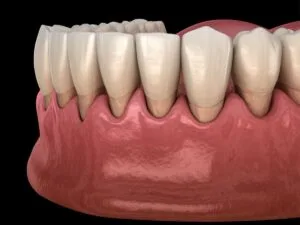
The gum is a soft tissue layer that covers the bone and tooth root. It is primarily responsible for protecting your teeth’s nerve endings. As you age, the gum tissue begins to wear, resulting in gum recession.
Sudden toothache can be a sign of gum recession, which exposes your teeth to pain and sensitivity due to a visible tooth root. Additionally, gum recessions can cause your gum line to flare up, putting you at risk for gum disease and tooth infections.
Your dentist will be able to prescribe a variety of treatment options that best suit your dental needs based on the type of gum recession you have. Topical antibiotics, orthodontics, and dental bonding are examples of non-surgical treatments for mild gum recession.
The condition of receding gums may need to be corrected with gum recession surgery, however, if they are severely receding. At All smiles Dental Spa, we have the most qualified periodontal experts to treat receding gums using modern approaches.
2. Enamel Erosion:
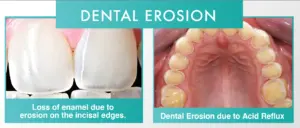
It is a condition in which your enamel structure and the dentin that makes up it are depleted. Acidic diets are one of the major factors that contribute to enamel erosion. When these acids are exposed to your teeth, the enamel, the hard protective coating of your teeth, wears away. This can result in significant pain and sensitivity to the teeth.
As well as causing sharp pain in the teeth, dental erosion can also increase your risk of cavities, tooth decay, irregular teeth, and other dental problems.
Having sensitive teeth caused by enamel erosion can affect your quality of life. Therefore, if you notice any sensitivity issues with your teeth, you should consult a dentist as soon as possible. Therefore, you will not be able to eat or drink without experiencing intolerable pain in your teeth. In order to relieve pain and restore the function of your teeth, a dentist can suggest a number of treatment options, including dental fillings, crowns, bonding, or veneers.
3. Tooth Decay & Cavities:
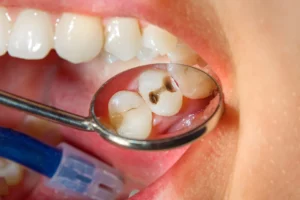
You can easily be susceptible to dental problems like tooth decay and cavities if you do not maintain good oral hygiene.
You might inadvertently overlook some areas of your mouth when you brush your teeth. Bacteria lodged between the corners of teeth can form a sticky layer of plaque when this occurs.
Eventually, due to negligent dental behavior, plaque deteriorates into decay and creates cavities in your teeth. As a result, you may experience sudden tooth pain that prevents you from being able to consume food, talk, work or study.
You may require dental procedures ranging from simple fluoride treatments to dental fillings or even root canals, depending on the extent of tooth decay and the size of the cavity in your teeth.
4. Gum Infections:
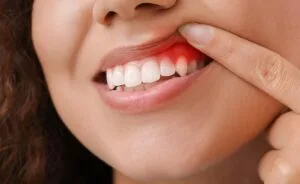
Gum infection is one of the reasons for sudden tooth pain. If left untreated, the intolerable pain caused by infected gums can lead to worse dental conditions like gum disease and periodontal disease.
A lack of proper oral hygiene can lead to gum infections. Cavities and tooth decay, for example, are more commonly associated with poor oral health, but gum infections are rare.
Thus, you need to be careful when eating and drinking foods that can damage your teeth and gums. Nevertheless, if you have gum disease, you will need to undergo treatments such as professional dental cleanings or deep cleanings. It is usually performed by a dental hygienist or a periodontist.
5. Fractured Tooth or Teeth:
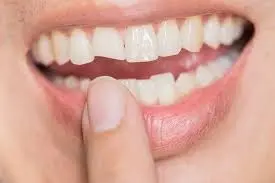
Even if you maintain good oral hygiene you can still experience sudden, sharp pain in your teeth.
Another cause of sudden toothache is fractured teeth, which occur when you grind or clench your teeth. In addition to developing excruciating pain as a result of fractured teeth, the wear and tear of enamel can also lead to increased sensitivity of your teeth.
Therefore, in order to relieve your teeth pain, you may require either dental crowns or dental implants to fix your damaged tooth. Furthermore, you should avoid poor dental habits such as grinding and clenching.
Maintaining good oral hygiene and have regular dental check-ups will help to prevent toothache and the associated discomfort.
Leave a reply
Leave a reply